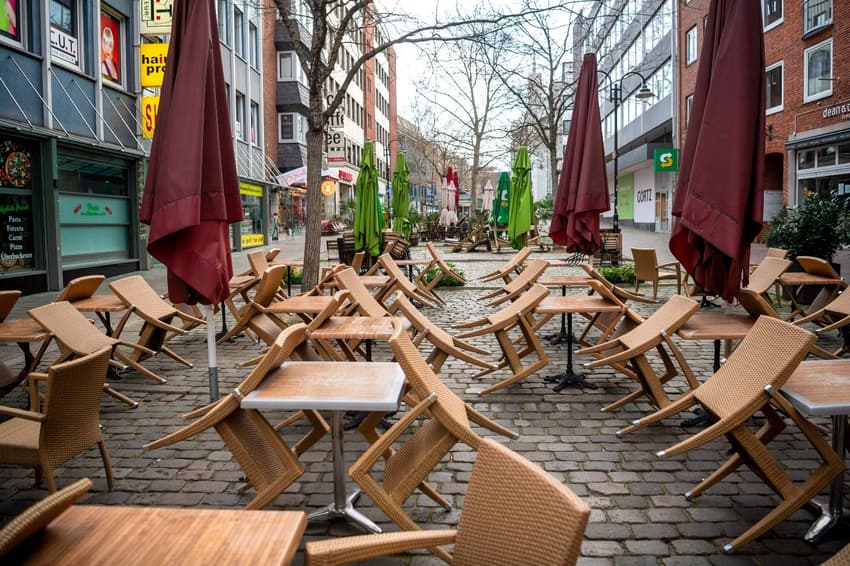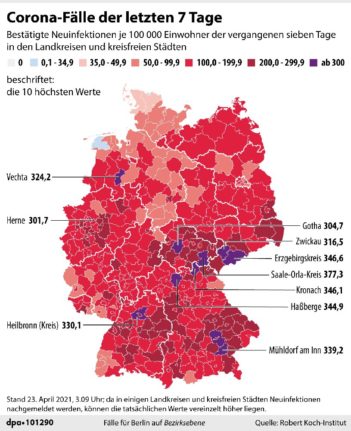Germany's new 'emergency brake' Covid restrictions come into force Saturday

Residents in Germany will have to prepare for new coronavirus restrictions this weekend as a new national law comes into effect.
The controversial changes to the Infection Protection Act come into force on Friday.
And in districts and cities with a 7-day incidence of more than 100 Covid cases per 100,000 residents in the last three days, the federal "emergency brake" Covid measures are to take effect automatically from Saturday, the Interior Ministry said.
Ministry spokesman Steve Alter said that under state law, the authorities responsible for affected districts and cities have to announce that the emergency brake is coming in on Saturday before the end of the day on Friday.
The law was passed earlier this week by the Bundestag before it was approved by the Bundesrat, which represents the 16 states.
According to the RKI dashboard, around 351 districts and cities in Germany have a 7-day incidence above 100. On Friday Germany logged 27,543 cases within the last 24 hours, and 265 deaths.
The nationwide 7-day incidence increased to 164.
READ MORE: Where are Covid-19 cases going up (and down) in Germany?
What are the rules?
The emergency brake measures come into force if the number of reported new infections per 100,000 inhabitants in a district or city exceeds 100 within seven days for three days in a row.
The map below by DPA shows the worst-hit areas (above an incidence of 300) in dark purple. Dark red areas have an incidence above 200, and the red areas have an incidence above 100.

Then, as a rule, people are no longer allowed to leave their homes between 10pm-5am unless it's for an essential reason like work or a medical emergency. Walking and jogging alone outside is allowed until midnight.
No more than one household can meet with another person, with the exception of children up to 14. Shops can only open for customers who present a negative Covid-19 test and have booked an appointment. Classroom attendance at schools is to be stopped at an incidence of 165 for three days.
READ MORE: EXPLAINED - What you need to know about Germany's new Covid-19 nationwide rules
The guidelines have been formulated by the government but states must implement them. Previously, virus restrictions in Germany have been decided in consultations between Merkel and the leaders of the 16 states.
However, often regional leaders have failed to put in place shutdown measures which they agreed with Merkel, with many choosing broad interpretations of the rules.
What's the reaction?
It's been mixed. The German District Association slammed the regulations, saying states can now not as easily react flexibly to the infection situation on the ground.
"The federal emergency brake is not the beneficial instrument it is thought to be," said Landkreistag President Reinhard Sager told the Rheinische Post. He also said it could be "confusing" for people.
Several state premiers also spoke out against the Bundesrat hearing of the law on Thursday.
Hamburg's mayor Peter Tschentscher (SPD) said it was positive that there is a binding regulation for the whole of Germany.
But he slammed the government for softening of the initial restriction - the curfew was planned to come into force at 9pm but then changed to 10pm after the opposition rallied against it.
Tschenscher also considers it inconsistent to open up shops through 'click and meet', i.e. shopping after making an appointment, instead of closing them when cases rise.
Hamburg has had 'emergency brake' measures in place for several weeks now, including a 9pm curfew - and initial signs show the incidence is decreasing.
ANALYSIS: Is Hamburg proof that an ’emergency brake’ can get Covid-19 cases down?
Meanwhile, Hesse's Prime Minister Volker Bouffier (CDU) said the law was "highly vulnerable" from a legal point of view and posed a "lot of practical problems".
And Mecklenburg-Western Pomerania's state premier Manuela Schwesig said the changes could lead to a "constant back and forth" of differing rules which would "unsettle people".
She said her state was sticking to protective measures that went beyond those of the federal government.
As with all our stories, we aim to give you the most up-to-date information. However, please check with your local government for any regional variations.
Comments (3)
See Also
The controversial changes to the Infection Protection Act come into force on Friday.
And in districts and cities with a 7-day incidence of more than 100 Covid cases per 100,000 residents in the last three days, the federal "emergency brake" Covid measures are to take effect automatically from Saturday, the Interior Ministry said.
Ministry spokesman Steve Alter said that under state law, the authorities responsible for affected districts and cities have to announce that the emergency brake is coming in on Saturday before the end of the day on Friday.
The law was passed earlier this week by the Bundestag before it was approved by the Bundesrat, which represents the 16 states.
According to the RKI dashboard, around 351 districts and cities in Germany have a 7-day incidence above 100. On Friday Germany logged 27,543 cases within the last 24 hours, and 265 deaths.
The nationwide 7-day incidence increased to 164.
READ MORE: Where are Covid-19 cases going up (and down) in Germany?
What are the rules?
The emergency brake measures come into force if the number of reported new infections per 100,000 inhabitants in a district or city exceeds 100 within seven days for three days in a row.
The map below by DPA shows the worst-hit areas (above an incidence of 300) in dark purple. Dark red areas have an incidence above 200, and the red areas have an incidence above 100.

Then, as a rule, people are no longer allowed to leave their homes between 10pm-5am unless it's for an essential reason like work or a medical emergency. Walking and jogging alone outside is allowed until midnight.
No more than one household can meet with another person, with the exception of children up to 14. Shops can only open for customers who present a negative Covid-19 test and have booked an appointment. Classroom attendance at schools is to be stopped at an incidence of 165 for three days.
READ MORE: EXPLAINED - What you need to know about Germany's new Covid-19 nationwide rules
The guidelines have been formulated by the government but states must implement them. Previously, virus restrictions in Germany have been decided in consultations between Merkel and the leaders of the 16 states.
However, often regional leaders have failed to put in place shutdown measures which they agreed with Merkel, with many choosing broad interpretations of the rules.
What's the reaction?
It's been mixed. The German District Association slammed the regulations, saying states can now not as easily react flexibly to the infection situation on the ground.
"The federal emergency brake is not the beneficial instrument it is thought to be," said Landkreistag President Reinhard Sager told the Rheinische Post. He also said it could be "confusing" for people.
Several state premiers also spoke out against the Bundesrat hearing of the law on Thursday.
Hamburg's mayor Peter Tschentscher (SPD) said it was positive that there is a binding regulation for the whole of Germany.
But he slammed the government for softening of the initial restriction - the curfew was planned to come into force at 9pm but then changed to 10pm after the opposition rallied against it.
Tschenscher also considers it inconsistent to open up shops through 'click and meet', i.e. shopping after making an appointment, instead of closing them when cases rise.
Hamburg has had 'emergency brake' measures in place for several weeks now, including a 9pm curfew - and initial signs show the incidence is decreasing.
ANALYSIS: Is Hamburg proof that an ’emergency brake’ can get Covid-19 cases down?
Meanwhile, Hesse's Prime Minister Volker Bouffier (CDU) said the law was "highly vulnerable" from a legal point of view and posed a "lot of practical problems".
And Mecklenburg-Western Pomerania's state premier Manuela Schwesig said the changes could lead to a "constant back and forth" of differing rules which would "unsettle people".
She said her state was sticking to protective measures that went beyond those of the federal government.
As with all our stories, we aim to give you the most up-to-date information. However, please check with your local government for any regional variations.
Join the conversation in our comments section below. Share your own views and experience and if you have a question or suggestion for our journalists then email us at [email protected].
Please keep comments civil, constructive and on topic – and make sure to read our terms of use before getting involved.
Please log in here to leave a comment.